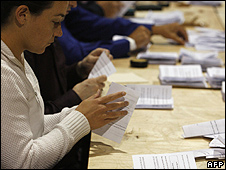
Opinion polls suggest that second time round the Yes camp will win
|
The Republic of Ireland will hold a second referendum on the EU's controversial Lisbon Treaty on 2 October, Irish PM Brian Cowen says. He made the announcement in the Irish parliament on Wednesday. The treaty, aimed at streamlining EU institutions, was rejected by Irish voters by referendum in June last year. Mr Cowen has now secured binding EU guarantees that Lisbon will not affect Irish sovereignty over key issues such as military neutrality and abortion. These issues, along with taxation policy, were identified as major concerns of Irish voters. "I believe these concerns have been addressed now in the shape of the legal guarantees," Mr Cowen told parliament on Wednesday. "On that basis, I recommended to the government that we return to the people to seek their approval for Ireland to ratify the treaty and that referendum will take place on 2 October." Most EU member states have ratified the treaty, but the Eurosceptic presidents of the Czech Republic and Poland have not yet signed it, saying they will wait for the decision of Irish voters. Institutional changes Ireland was the only EU member state to put the treaty to a referendum, and the second Irish vote is seen as the last major hurdle delaying its entry into force. The treaty's opponents argue that it is just the defunct EU Constitution repackaged, and say it will undermine national sovereignty. The constitution was rejected by French and Dutch voters in 2005. EU leaders and other pro-Lisbon politicians say the treaty is needed to make the enlarged 27-nation EU more efficient. Under Lisbon, the six-monthly rotating EU presidency would be replaced by one that runs for two-and-a-half years, there would be a powerful new foreign affairs chief and the European Parliament would gain wider powers. The treaty would give the parliament a bigger say over the appointment of the new European Commission and would boost the number of Euro MPs from 736 to 754. But the number of commissioners would be kept at 27.
|

~RS~q~RS~~RS~z~RS~06~RS~)

~RS~q~RS~~RS~z~RS~06~RS~)
Bookmark with:
What are these?